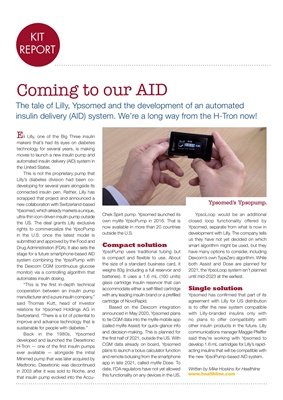
KIT
KIT
REPORT
The tale of Lilly, Ypsomed and the development of an automated
insulin delivery (AID) system. We're a long way from the H-Tron now!
Eli Lilly, one of the Big
Three insulin makers
that's had its eyes on
diabetes technology for
several years, is making
moves to launch a new insulin pump and
automated insulin delivery (AID) system in
the United States.
This is not the proprietary pump that
Lilly's diabetes division had been codeveloping for several years alongside its
connected insulin pen. Rather, Lilly has
scrapped that project and announced a
new collaboration with Switzerland-based
Ypsomed, which already markets a unique,
ultra-thin icon-driven insulin pump outside
the US. The deal grants Lilly exclusive
rights to commercialize the YpsoPump
in the U.S. once the latest model is
submitted and approved by the Food and
Drug Administration (FDA). It also sets the
stage for a future smartphone-based AID
system combining the YpsoPump with
the Dexcom CGM (continuous glucose
monitor) via a controlling algorithm that
automates insulin dosing.
"This is the first in-depth technical
cooperation between an insulin pump
manufacturer and a pure insulin company,"
said Thomas Kutt, head of investor
relations for Ypsomed Holdings AG in
Switzerland. "There is a lot of potential to
improve and advance technology that is
sustainable for people with diabetes."
Back in the 1980s, Ypsomed
developed and launched the Diesetronic
H-Tron - one of the first insulin pumps
ever available - alongside the initial
Minimed pump that was later acquired by
Medtronic. Diesetronic was discontinued
in 2003 after it was sold to Roche, and
that insulin pump evolved into the AccuChek Spirit
pump. Ypsomed launched its
own mylife YpsoPump in 2016. That is
now available in more than 20 countries
outside the U.S.
Compact solution
YpsoPump uses traditional tubing but
is compact and flexible to use. About
the size of a standard business card, it
weighs 83g (including a full reservoir and
batteries). It uses a 1.6 mL (160 units)
glass cartridge insulin reservoir that can
accommodate either a self-filled cartridge
with any leading insulin brand or a prefilled
cartridge of NovoRapid.
Based on the Dexcom integration
announced in May 2020, Ypsomed plans
to tie CGM data into the mylife mobile app
(called mylife Assist) for quick-glance info
and decision-making. This is planned for
the first half of 2021, outside the US. With
CGM data already on board, Ypsomed
plans to launch a bolus calculator function
and remote bolusing from the smartphone
app in late 2021, called mylife Dose. To
date, FDA regulators have not yet allowed
this functionality on any devices in the US.
YpsoLoop would be an additional
closed loop functionality offered by
Ypsomed, separate from what is now in
development with Lilly. The company tells
us they have not yet decided on which
smart algorithm might be used, but they
have many options to consider, including
Dexcom's own TypeZero algorithm. While
both Assist and Dose are planned for
2021, the YpsoLoop system isn't planned
until mid-2023 at the earliest.
Single solution
Ypsomed has confirmed that part of its
agreement with Lilly for US distribution
is to offer the new system compatible
with Lilly-branded insulins only with
no plans to offer compatibility with
other insulin products in the future. Lilly
communications manager Maggie Pfeiffer
said they're working with Ypsomed to
develop 1.6 mL cartridges for Lilly's rapidacting
insulins that will be compatible with
the new YpsoPump-based AID system.
Written by Mike Hoskins for Healthline
An Ypsomed Ypsopump in a man's hands.
www.healthline.com
COMING TO OUR AID